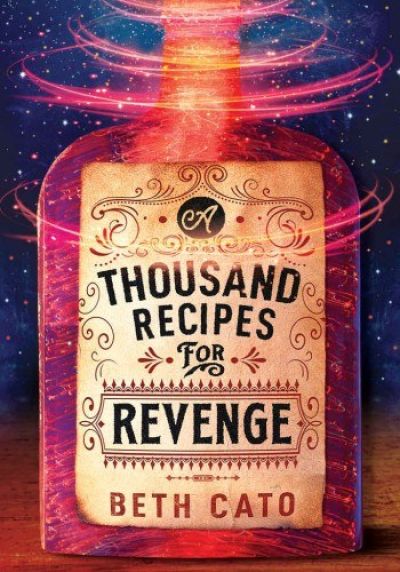Taste of Betrayal
A Thousand Recipes for Revenge (Chefs of the Five Gods, volume 1)
By Beth Cato

29 Jun, 2023
A Thousand Recipes for Revenge is the first volume in Beth Cato’s Chefs of the Five Gods series.
Adamantine “Ada” Garland seems to be an unremarkable employee of an unremarkable inn. She is a wanted deserter and a Chef with a god-touched tongue. The recent presence of gendarmes at the inn is a matter of great concern.
Far from Ada, Braiz’s Princess Solenn is preparing for her impending wedding to Verdanian Prince Rupert. Braizian-Verdanian relations, currently strained, depend on the match. Braiz being almost defenseless due to a recent calamity, Solenn bears the future of her nation on her shoulders.
At least Rupert is not as disappointing a royal as is his father, King Caristo. If only the prince had not been targeted by assassins. Solenn is alarmed to notice that the prince’s wine is poisoned. Not only has she no desire to see the boy dead, the fact that she can tell from a distance that his wine is poisoned means that she has a god-touched tongue. She is a Chef.
Solenn saves Rupert with a too-hearty toast that breaks both glasses. One hasty consultation with her personal captain and guardian Erwan reveals previously unknown facts to Solenn. She is not the daughter of Braiz’s King and Queen but the daughter of a rogue Chef named Adamantine Garland and her protector Erwan, who were unwillingly separated by one of Caristo’s deluded decrees. Solenn gets her gift via her mother.
Chefs have very special destinies, but these boil down to involuntary servitude to the state or worse. Solenn cannot warn the prince of the attempts on his life without explaining how she knows someone is poisoning his food. It does not take long for one such attempt to succeed.
Suspicion for Rupert’s murder falls on Solenn, whose anxiety prior to Rupert’s death is taken to be that of a nervous assassin. Her immediate future in Verdania being grim, escape and flight are prudent options.
Elsewhere, Ada discovers that while the gendarmes have no interest in her, an old enemy with a very long memory is keenly interested in Ada and her old service-mates. Ada’s foe intends to kill Ada and company and convert them into magical food. Indeed, by the time her enemy works his way down his list, a number of Ada’s friends are dead.
Ada is facing a determined, deranged psychopath; she is in deep trouble. But as bad as things are, they can always get worse. The true menace is the wrath of a living, angry god for whom the madman is a convenient weapon.
~oOo~
I complain interminably about castle operas, so it must be noted that this particular depiction of monarchy is in no way complimentary about monarchies. Reading between the lines, Braiz’s monarchs passed Solenn off as their own so as to have an expendable child they could marry off to Verdania, King Caristo is a knucklehead who mistakes vindictive whim for insightful rule, and the only competent senior administrator who plays a significant role in the plot, the previously unmentioned Lord Whitney of the also previously unmentioned Albion, is both off-stage and not a monarch but an advisor.
For that matter, the five living gods (former humans who ascended through means unclear) don’t make a strong case for divine rulership. Their gifts make the recipients’ lives worse [1] and at least one of the gods has decided to throw a petulant fit.
So, about the cannibalism: in a sense this novel is about the evils of processed food, in the sense that the foods eaten to gain various benefits often begin as the flesh of intelligent beings, transformed through various techniques that are generally speaking fatal to the beings either directly, because transformation involves deadly poison, or indirectly, because dead people scream less than living when one eats them. Those eaten object to being seen as food. Those in power are realists who understand that sometimes other people have to make sacrifices.
Cato’s world-building is oddly old-fashioned, harking back to the old days when fantasy nations were as often as not thinly veiled analogs of historical nations. Ada is a more interesting character than her more passive daughter Solenn. The plot itself moves brisky, stakes escalating along the way, which raises the question “if the final stakes in this book are forestalling the wrath of an angry god, what can Cato possibly do in the sequel?” No doubt readers will find out.
A Thousand Recipes for Revenge is available here (Amazon US), here (Amazon Canada), here (Amazon UK), here (Barnes & Noble), and here (Chapters-Indigo).
I have no idea if A Thousand Recipes for Revenge is available from Apple Books.
1: Because being god-touched makes one a potential asset to states disinclined to hear the word “no.”
